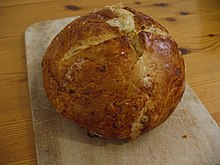Poschweck
The Poschweck (from Paschen "Easter" and Weck "rolls"), also in Aachen Easter bread called, is since the late Middle Ages, a traditional pastry for Easter from Aachen .
composition
The basis of the Poschweck is a yeast dough that is made from flour, water and baker's yeast , kneaded and left to prove several times. Later, flour and butter , orange peel , lemon peel , nuts or raisins as well as rock candy or sugar cubes are added before it is shaped into a loaf of bread . This is brushed with beaten eggs, cut lengthways for better development of the aroma and baked. After the baking process, it can also be decorated with sliced almonds or pieces of sugar before it cools down.
history
The first mention of the Poschweck can be found in 1547 in an Aachen baker's order. After a period of fasting that was still rigid at the time, it was supposed to be the first high caloric enrichment for the Easter table. That is why the Poschweck in Aachen and the surrounding area was first given to regular customers as an Easter present. Gradually this costly business became too expensive for the bakers and from then on they wanted to either sell it or stop production. This caused resentment among the population and the master craftsmen were first forced by the magistrate in 1760 to continue to bake the Easter biscuits and distribute them free of charge.
After the French invaded in 1794, the authorities initially banned the baking of white bread in order to contain the consequences of the famine. After the usual Easter present from bakers to customers was refused in the following year, this met with violent protests from the population in Aachen, so that on April 1, 1796, contrary to its earlier opinion, the city council issued an order for an immediate delivery of the Easter wakes to effect within 10 days. Refusal could result in a fine of 50 Reichsthalers.
It was half a century before the bakers rose again to resist. On April 12, 1846, when Aachen belonged to Prussia , there was another “Poschweck Revolution” after 113 master bakers had decided to donate 800 loaves of bread instead of the Poschweck for the poor houses , the production of which was many times cheaper . This led to half-humorous, half-serious riots among the population, in the course of which the window panes of some bakeries broke and the police were forced to restore civil order. The Prussian city government supported the position of the protesting population. Some of the "Poschweck revolutionaries" were punished, but the bakers were again forced to continue to deliver the Poschweck free of charge. It was not until 1888 that the bakers finally managed to free themselves from this obligation. Since then there has been no free bread in Aachen and the surrounding area .
literature
- Franz Oppenhoff: An ordinance of the Aachen municipality of April 1, 1796, by which the city's bakers are forced to deliver the traditional Easter wake . In: Communications of the Association for Children of Aachen Prehistory . Seventh year, Cremersche Buchhandlung Aachen, Aachen 1894, pp. 79–80 ( digitized version )
Web links
- Easter in NRW - loud, quiet, rapid and calm. In: FineArtReisen, the travel newspaper on the Internet. February 14, 2008, archived from the original on March 4, 2016 ; accessed on April 11, 2019 .
- Georg Dünnwald: "A Poschweck is still real manual work". In: Aachener Nachrichten. March 21, 2008, accessed April 11, 2019 .
Individual evidence
- ↑ Paschen . In: Rhenish dictionary . Vol. 6, arr. and ed. by Josef Müller , Erika Klopp Verlag, Berlin 1944, p. 535 ( digitized version ).
- ↑ Recipe for the Poschweck ( memento of the original dated November 1, 2017 in the Internet Archive ) Info: The archive link was automatically inserted and not yet checked. Please check the original and archive link according to the instructions and then remove this notice. on the website of the city of Aachen, accessed on October 21, 2016.
- ↑ History of the Poschwecks ( Memento of the original from November 1, 2017 in the Internet Archive ) Info: The archive link was inserted automatically and has not yet been checked. Please check the original and archive link according to the instructions and then remove this notice. on the website of the city of Aachen, accessed on March 30, 2013.
- ^ Franz Oppenhoff: An ordinance of the Aachen municipality of April 1, 1796, by which the city's bakers are forced to deliver the traditional Easter wake . In: Communications of the Association for Children of Aachen Prehistory . Seventh year, Cremersche Buchhandlung Aachen, Aachen 1894, p. 79 ( digitized version ).
- ^ Franz Oppenhoff: An ordinance of the Aachen municipality of April 1, 1796, by which the city's bakers are forced to deliver the traditional Easter wake . In: Communications of the Association for Children of Aachen Prehistory . Seventh year, Cremersche Buchhandlung Aachen, Aachen 1894, p. 80 ( digitized version ).
- ↑ Gert Olivier: From the Poschweck revolt to the lamb. The handicraft serves up at Easter . In: Magazine of the Aachen district craft association . Issue 1, Aachen 2006, pp. 20–22 ( digital copy [PDF; 2.1 MB]).

